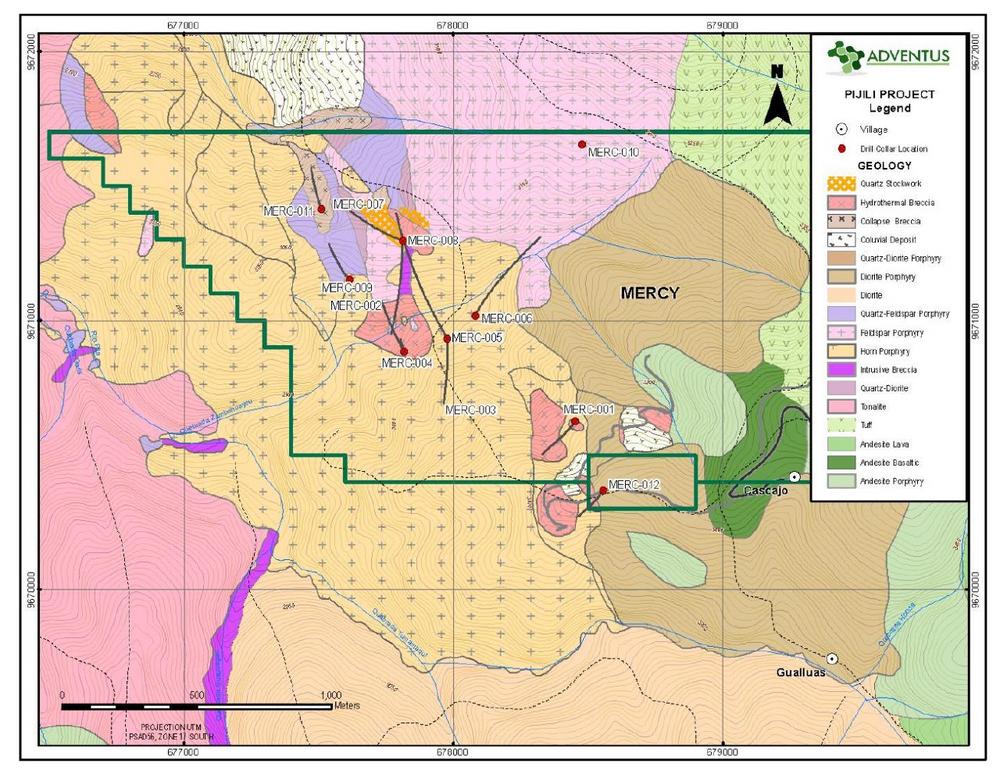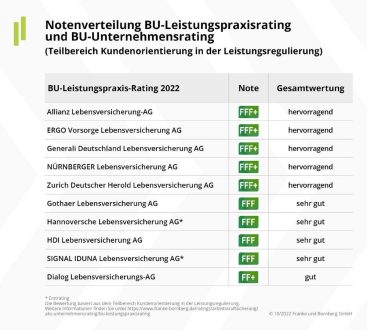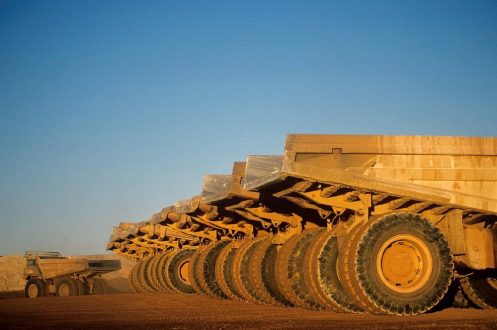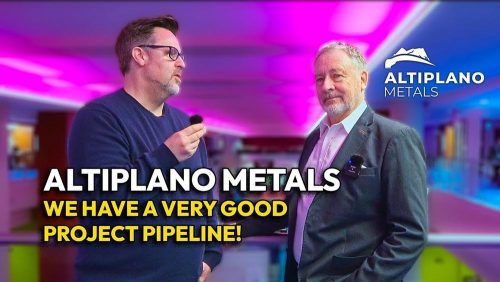
Adventus and Salazar announce the remaining drill hole results from Pijili project, highlighted by 18.55 metres grading 0.99% copper, 0.25 g/t gold, 0.03% molybdenum, 189.8 g/t silver, and 0.23% tungsten
Highlights:
- MERC-011 intersected a high-grade, near-surface silver-tungsten zone over 18.55 metres, grading 0.99% copper, 0.25 g/t gold, 0.03% molybdenum, 189.8 g/t silver and 0.23% tungsten, which overprinted the top of a broader 151.81 metres of porphyry mineralization grading, 0.25% copper, 0.08 g/t gold, 0.01% molybdenum, and 3.2 g/t silver for 0.35% copper equivalent (“CuEq”)
- 10 of 12 drill holes intersected porphyry mineralization greater than 100 metres with mineralized widths ranging between 100 to 424 metres
- Porphyry mineralization has been traced from the artisanal mine over a 2.0 km strike length to the northwest
- Fieldwork continues to follow-up the mineralized trend with manual test pitting tracing the surface expression of porphyry mineralization
Jason Dunning, Vice President Exploration of Adventus, stated: “The Pijili project’s MERC-011 results come after substantial technical work hunting for the newly discovered Ensillada copper porphyry system over the last two years on our Mercy concession. Porphyry mineralization has been intersected in all our wide-spaced drill holes, so the entire Geology & Exploration team can be extremely proud of this discovery. The results so far are a credit to our district scale approach for the Pijili project and clearly show that our hunt has only just begun, as evidenced by our recent announcement of four new targets on the Rosa de Oro and Carmen de Pijili concessions 8 km to the west of the Ensillada discovery.”
Drilling Results
Between July 2020 and March 2021, the Partners completed a total of twelve drill holes on the Mercy concession, all of which hit porphyry-style copper-gold-molybdenum mineralization. Ten of the twelve drill holes intersected greater than 100 metres of porphyry mineralization ranging between 100 to 424 metres. The wide-spaced exploration drilling has traced porphyry-style mineralization approximately 2 km from the artisanal mine site (see June 8, 2020 and October 26, 2020 news release) northwest to the northern Mercy concession boundary.
MERC-011 is located 1.2 km northwest from MERC-002 (which intersected 145.22 metres, grading 0.22% copper, 0.04 g/t gold, 0.01% molybdenum and 1.0 g/t silver for 0.30% CuEq, see October 26, 2020 news release), and about 280 metres south of the northern property boundary. This drill hole yielded the best intercept of porphyry-style mineralization for the project, in an area where manual test pits have defined a large area of copper sulphide minerals in bedrock including chalcopyrite, minor bornite and trace covellite. A total of 125 samples have been collected at the bedrock interface noting that 25 samples had greater than 0.10% copper with 8 of those samples having greater than 0.30% copper. One sample, 61053, located 45 metres northwest of the drill collar for MERC-011, graded 0.94% copper, 0.18 g/t gold, 0.01% molybdenum, and 12.3 g/t silver.
Drill hole MERC-011 was drilled in a northwest orientation and completed at 351.00 metres, intersecting porphyry-style mineralization from surface (0.70 metres) to a depth of 152.51 metres, grading 0.25% copper, 0.08 g/t gold, 0.01% molybdenum, and 3.2 g/t silver (0.35% CuEq). A higher-grade subset occurs from 4.70 to 23.25 metres, grading 0.99% copper, 0.25 g/t gold, 0.03% molybdenum, and 189.8 g/t silver.
An interesting component of the higher-grade subset interval for MERC-011 is the presence of significantly elevated silver and tungsten, which has not been seen in other completed drill holes. The association of tungsten to the porphyry system in this particular case is unknown at this time but it currently interpreted to be a separate, overprinting mineralizing event to the main Ensillada porphyry system. The tungsten appears to be directly linked to the high-grade silver values, with four samples yielding tungsten values greater than 0.02%, which triggered overlimit testing. The overlimit testing yielded a range of tungsten values from 0.29% to one value greater than 1.00%. The one sample with more than 1.00% tungsten triggered another overlimit test, but results are not available currently. Using available results, the higher-grade subset in MERC-011 has a tungsten grade of 0.23% from 4.70 to 23.25 metres with silver grading 189.8 g/t. Tungsten is commonly found in greisen and skarn systems, occurring mainly as wolframite (iron–manganese tungstate (Fe,Mn)WO4, which is a solid solution of the two minerals ferberite FeWO4, and hübnerite MnWO4) and scheelite (calcium tungstate (CaWO4). Other tungsten minerals range in their level of abundance from moderate to very rare. No mineralogical work has been done to characterize the tungsten-hosting mineral in MERC-011.
MERC-004 was designed to further evaluate the hydrothermal breccias of the Zambohuaycu showing and those intersected in MERC-002 (see October 26, 2020 news release). Two zones of hydrothermal breccia were intersected from 22.20 to 66.70 metres and from 72.40 to 79.08 metres. Both intervals contain variable concentrations of sulphide mineralization (chalcopyrite, pyrite, ± bornite, and ± molybdenite) and display biotite, chlorite, and sericite alteration. As seen in MERC-002, sporadic sulphide mineralization is present in both the feldspar porphyritic and hornblende porphyritic phases of the diorite intrusion below the upper hydrothermal breccia intervals.
MERC-005 was drilled from the same platform as MERC-003 and designed to test the area northeast of the Zambohuaycu showing. It intersected three phases of the diorite intrusion, a hornblende phyric phase from 10.50 to 416.55 metres, a feldspar phyric phase from 422.30 to 456.63 metres, and a quartz-rich phase from 463.04 to end of drill hole at 686.40 metres. Hydrothermal breccia was present from 167.15 to 179.75 metres. This drill hole displays stronger hydrothermal alteration and higher aggregate quartz dominant vein content (A-, B-, and AB-type) signatures relative to the prior holes located to the south. The pyrite ratio increases with depth, meaning chalcopyrite decreases and trails off after 500 metres, where pyrite shows a marked increase.
MERC-006 targeted the porphyry-style veining mapped on surface 300 metres northeast of the Zambohuaycu showing and to determine if hydrothermal breccia units could be traced over that distance. The drill hole remained in the hornblende phyric diorite intrusion except for one narrow interval of hydrothermal breccia (30.21 to 32.40 metres) and two magmatic breccia intervals (55.20 to 77.60 and 161.46 to 162.77 metres). Sulphide mineral content in the drill hole is variable, but the drill hole does contain minor chalcopyrite and pyrite mineralization.
MERC-007 targeted the Ensillada showing, 300 metres north of the Zambohuaycu showing. This is an area of extensive quartz dominant stockwork mapped on surface, which is represented in the drill hole in top 175.00 metres with narrow sections having between 10 to 30% veining. Copper sulphide minerals are noted over the entire hole length; however, the pyrite-chalcopyrite ratio remained high across two porphyry-style mineralization intercepts.
The high-grade silver from 569.80 to 570.31 metres is also associated with zinc mineralization. This interval graded 2.88% zinc over 0.51 metres. It is not uncommon to see such polymetallic veins associated with intrusion-related systems, however, this is the only known zinc occurrence on the Mercy concession.
Following up on MERC-007 and drilling from the same platform, MERC-008 targeted the area between Ensillada and Zambohuaycu showings south of MERC-007. This drill hole intersected numerous intervals of igneous breccia units but importantly hit hydrothermal crackle breccia from 246.00 to 329.50 metres downhole. For the first time, “shingle” or “corn flake breccia” texture has been observed in the drill holes at Mercy concession, with minor chalcopyrite and trace bornite associated. The hydrothermal alteration decreased in intensity with increasing depth.
After manual test pits identified widespread porphyry mineralization in Zambohuaycu Norte area, west along Ensillada Ridge (see October 26, 2020 news release), MERC-009 was designed to target copper surficial anomalies associated with the aerially extensive quartz vein stockwork mapped on surface 245 metres southwest of MERC-007 and MERC-008. It is an area of low manganese (Mn) which is a very positive indicator, though centred on a large Magnetic Susceptibility 3D inversion anomaly, likely linked to magnetite in the potassic alteration facies. Drill core logging noted a high percentage of quartz-dominant veining in top 150.00 metres of the drill hole with narrow sections, similar to MERC-007, having a range of 10 to 30% quartz veining a high pyrite to chalcopyrite ratio. Importantly, this is the first drill hole with tonalite, which is a key rocktype at the Chaucha copper-molybdenum deposit, approximately 5 km to the north.
The concept design for the MERC-010 drilling location was to evaluate the rocks beneath an interpreted relict lithocap where quartz pyrophyllite alteration had been mapped on surface. In general, the hydrothermal alteration and general character of the veins was different from the other drill holes in this program, but as the drill hole increased in depth, both biotite and chlorite alteration did increase, which also coincided with a decrease in the pyrite content and a slow increase in chalcopyrite. Copper started to pick up around 227.00 metres downhole, and a thick interval of porphyry mineralization was cored to 540.73 metres. This section of porphyry mineralization was the deepest intercept of the program.
MERC-012 was the final drill hole of the program designed to target the magnetic anomaly at depth under the two small artisanal mining concessions. It was setup 276 metres south of MERC-001 that intersected 64.60 metres, grading 0.1% copper, 0.20 g/t gold, 0.03% molybdenum, and 4.1 g/t silver (see October 26, 2020 news release). The drill hole was terminated at 491.08 metres due to the southern concession boundary to open ground. For the most part, the drill hole remained in hornblende phyric diorite, and only transitioned to quartz diorite at the end of the drill hole.
In terms of hydrothermal alteration, the intensity of alteration in MERC-012 increased downhole, which coincided with an increase in magnetite modal content, thereby suggesting a possible transition towards potassic alteration at depth. Sulphide content generally increased downhole even though like MERC-001 (see October 26, 2020 news release), the only notable porphyry mineralization occurred at the top of the drill hole; however, if not for the concession boundary, the favourable geology and intensifying alteration would have justified pushing the drill hole deeper.
Figure 1 illustrates the drill locations for the results of the nine drill holes outlined in this news release, as well as the three previously released drill holes (see October 26, 2020 news release). Drill collar location coordinates are summarized in Table 1 at the end of this news release.
Next Steps
Given the positive results from the drilling program on the Mercy concession intersecting porphyry mineralization in all twelve drill holes, the Partners are assessing opportunities for a second phase of exploration drilling for later in 2021 or early 2022 to focus on expanding the areas of higher-grade mineralization. Future drilling would continue developing the geological understanding of the new Ensillada porphyry system discovery. In the interim, fieldwork will continue advancing the manual test pit program to further trace porphyry mineralization to aid with the definition of drilling targets. This work on Mercy concession will run in parallel with the continued exploration on the Partner’s Rosa de Oro and Carmen de Pijili concessions 8.0 km to the west where targets are being developed for possible drill-ready status later in 2021 or early 2022 (see April 8, 2021 news release).
Technical Information and Quality Control & Quality Assurance (“QAQC”)
The Pijili project work program is being managed and reviewed by Vice President of Exploration for Adventus, Jason Dunning, M.Sc., P.Geo., a Qualified Person within the meaning of NI 43-101, who has also reviewed and approved the technical and scientific information of this news release as accurate. Technical staff collect and process samples that are securely sealed and shipped to Bureau Veritas (“BV”) in Quito for sample preparation that includes crushing and milling to prepare pulps that are then split for shipment to their facility in Lima, Peru and Vancouver, Canada for analysis. All assay data have undergone internal validation of QAQC; noting there is an established sampling control program with blind insertion of assay blanks, certified industry standards and sample duplicates for the Pijili project.
A QAQC program is also in place at BV and includes insertion of blanks, standards, and duplicate reanalysis of selected samples. BV’s quality system complies with the requirements for the International Standards ISO 9001:2000 and ISO 17025: 1999. At BV, gold is analyzed by classical fire assay techniques with an ICP-AES finish, and both silver and base metals are analyzed by a 46-element 4 acid digestion with ICP-MS technique. Overlimit protocols are in place for gold, silver, copper, molybdenum, and zinc.
Qualified Person
The technical information of this news release has been reviewed and verified as accurate by Mr. Jason Dunning, M.Sc., P.Geo., Vice President Exploration for Adventus, a non-Independent Qualified Person, as defined by NI 43-101.
About Adventus
Adventus Mining Corporation is an Ecuador focused copper-gold exploration and development company. Its strategic shareholders include Altius Minerals Corporation, Greenstone Resources LP, Wheaton Precious Metals Corp., and the Nobis Group of Ecuador. Adventus is advancing the El Domo copper-gold project through a feasibility study, while exploring the broader Curipamba district. In addition, Adventus is engaged in a country-wide exploration alliance with its partners in Ecuador, which has incorporated the Pijili and Santiago copper-gold porphyry projects to date. Adventus also controls an exploration project portfolio in Ireland with South32 Limited as funding partner as well as an investment portfolio of equities in several exploration companies. Adventus is based in Toronto, Canada, and is listed on the TSX Venture Exchange under the symbol ADZN and trades on the OTCQX under the symbol ADVZF.
About Salazar
Salazar Resources Limited is focused on creating value and positive change through discovery, exploration, and development in Ecuador. The team has an unrivalled understanding of the geology in-country and has played an integral role in the discovery of many of the major projects in Ecuador, including the two newest operating gold and copper mines. Salazar Resources has a wholly owned pipeline of copper-gold exploration projects across Ecuador with a strategy to make another commercial discovery and farm-out non-core assets. The Company actively engages with Ecuadorian communities and together with the Salazar family it co-founded The Salazar Foundation, an independent non-profit organization dedicated to sustainable progress through economic development. The Company already has carried interests in three projects. At its maiden discovery, Curipamba, Salazar Resources has a 25% stake fully carried through to production. At two copper-gold porphyry projects, Pijili and Santiago, the Company has a 20% stake fully carried through to a construction decision.
Neither the TSX Venture Exchange nor its Regulation Services Provider (as that term is defined in the policies of the TSX Venture Exchange) accepts responsibility for the adequacy or accuracy of this news release.
This press release contains “forward -looking information” within the meaning of applicable Canadian securities laws. Any statements that express or involve discussions with respect to predictions, expectations, beliefs, plans, projections, objectives, assumptions or future events or performance (often, but not always, identified by words or phrases such as “believes”, “anticipates”, “expects”, “is expected”, “scheduled”, “estimates”, “pending”, “intends”, “plans”, “forecasts”, “targets”, or “hopes”, or variations of such words and phrases or statements that certain actions, events or results “may”, “could”, “would”, “will”, “should” “might”, “will be taken”, or “occur” and similar expressions) are not statements of historical fact and may be forward-looking statements.
Forward-looking information herein includes, but is not limited to, statements that address activities, events, or developments that Adventus and Salazar expect or anticipate will or may occur in the future. Although Adventus and Salazar have attempted to identify important factors that could cause actual actions, events, or results to differ materially from those described in forward-looking information, there may be other factors that cause actions, events or results not to be as anticipated, estimated, or intended. There can be no assurance that such information will prove to be accurate, and actual results and future events could differ materially from those anticipated in such information. Accordingly, readers should not place undue reliance on forward-looking information. Adventus and Salazar undertake to update any forward-looking information except in accordance with applicable securities laws.
For further information from Adventus, please contact Christian Kargl-Simard, President and Chief Executive Officer, at +1-416-230-3440 or christian@adventusmining.com. Please also visit the Adventus website at www.adventusmining.com and LinkedIn page at https://www.linkedin.com/company/adventus-mining-corporation.
For further information from Salazar, please contact ir@salazarresources.com.
Swiss Resource Capital AG
Poststrasse 1
CH9100 Herisau
Telefon: +41 (71) 354-8501
Telefax: +41 (71) 560-4271
http://www.resource-capital.ch
CEO
Telefon: +41 (71) 3548501
E-Mail: js@resource-capital.ch
![]()



